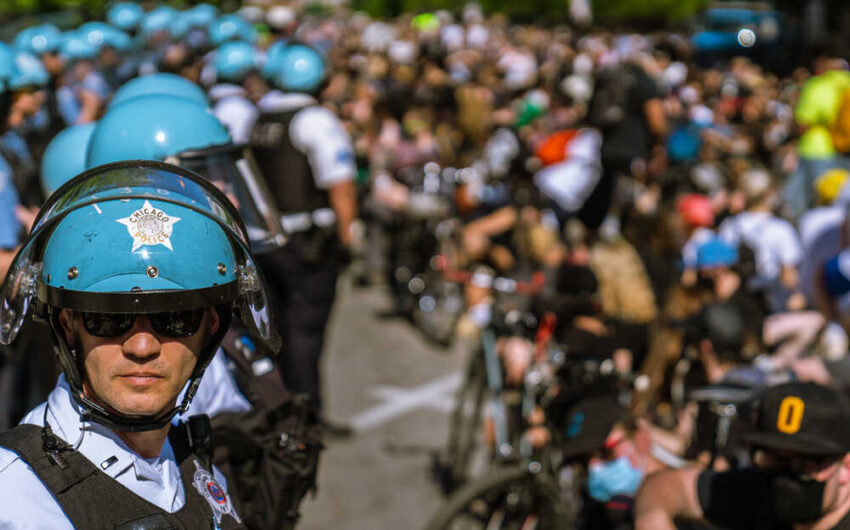(LibertySociety.com) – Federal agents and National Guard troops patrolling Chicago’s streets, imagine the uproar, the lawsuits, the political theater, and the city’s future hanging in the balance as President Trump claims only he can restore order where local leaders have “failed.”
Story Snapshot
- President Trump vows to deploy federal forces to Chicago, citing crime reductions in D.C. after a similar intervention.
- Chicago’s mayor and Illinois governor denounce the plan as unconstitutional, preparing legal challenges.
- Federal-local power struggles reignite, with race, public safety, and urban autonomy fueling the debate.
- Residents and experts split, some demand federal help, others fear loss of civil liberties and trust.
Trump’s D.C. “Success” Sets the Stage for Chicago Showdown
On August 22, 2025, President Donald Trump announced that Chicago would become the next battleground in his ongoing federal crime crackdown. He declared victory in Washington, D.C., where days earlier he had federalized the Metropolitan Police and unleashed a wave of federal agents and National Guard troops. Trump claimed D.C.’s crime rates nosedived as a result, a talking point he’s using to justify a similar, and arguably more controversial, intervention in Chicago. The move instantly set the stage for a constitutional clash, as Trump framed it as a necessary rescue mission for a city he says has been failed by its Democratic leadership.
Chicago, with its long-running struggle against violent crime, has often found itself the subject of national debate. Trump’s decision to target the city was not entirely unexpected. He has repeatedly criticized Chicago’s leaders and cited what he claims are pleas from local residents, especially Black women, for federal intervention. However, the president’s plan is anything but routine. Federal intervention in a major city’s day-to-day policing, especially without local consent, is extraordinarily rare and fraught with legal peril. The Home Rule Act may permit such action in D.C., but Chicago operates under a completely different set of laws and political realities. This distinction is not lost on local officials, who responded with swift and unified outrage.
Chicago’s Leadership Draws a Line in the Sand
Mayor Brandon Johnson wasted no time blasting Trump’s plan as “costly, illegal and unconstitutional.” Together with Illinois Governor J.B. Pritzker, Johnson vowed to fight any deployment of federal agents or troops in court. Both leaders cited recent local crime data showing improvements in violent crime rates, which they say prove that homegrown strategies are starting to pay off. The mayor argued that federal muscle would not only erode community trust but also threaten the city’s hard-won progress in police reform and public safety. Johnson’s message was clear: Chicago would not stand for an occupation, and any such move would be met with “every legal tool at our disposal.”
This fierce resistance is more than political theater. The legal ground for federal intervention in Chicago is weak. Unlike D.C., where the Home Rule Act offers a federal lever, cities like Chicago require state or local consent for such measures. Legal scholars and policing experts warn that using federal agents or National Guard troops without invitation could run afoul of the Constitution and the Posse Comitatus Act, which restricts military involvement in domestic law enforcement. The battle lines are drawn, not just between red and blue, but between Washington and local autonomy, with the courts likely to play referee.
Chicago Residents Caught Between Order and Overreach
Chicagoans themselves are anything but monolithic on the issue. Some residents, particularly those in neighborhoods hardest hit by violence, express cautious support for federal action, hoping it might finally bring relief where local policies have struggled. Others, however, see the specter of federal agents and troops as a dire threat to civil liberties, fearing a new era of militarized policing and strained community relations. The city’s history and demographics, majority-minority, deeply Democratic, and scarred by past policing controversies, fuel deep skepticism about outside intervention. The debate on the ground is as fractured as the city itself.
The stakes go far beyond Chicago’s city limits. Trump’s move is testing not only the limits of presidential power but also the very nature of federalism in America. If federal agents can take over Chicago’s streets against the will of local leaders, what precedent does that set for cities across the nation? Policing experts and urban policy analysts warn of a slippery slope, where federal crackdowns become political tools wielded at will. Meanwhile, the threat of legal battles, protests, and civil unrest looms large, with the potential to reshape how America thinks about law, order, and who gets to enforce it.
Copyright 2025, LibertySociety.com .
Click this link for the original source of this article.
Author: Editor
This content is courtesy of, and owned and copyrighted by, https://libertysociety.com and its author. This content is made available by use of the public RSS feed offered by the host site and is used for educational purposes only. If you are the author or represent the host site and would like this content removed now and in the future, please contact USSANews.com using the email address in the Contact page found in the website menu.





